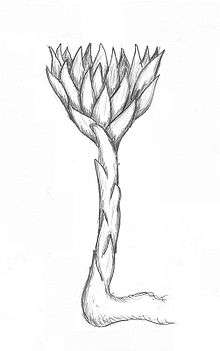Rhizanthella slateri
| Rhizanthella slateri | |
|---|---|
 | |
| Eastern underground orchid | |
| Scientific classification | |
| Kingdom: | Plantae |
| (unranked): | Angiosperms |
| (unranked): | Monocots |
| Order: | Asparagales |
| Family: | Orchidaceae |
| Subfamily: | Orchidoideae |
| Tribe: | Diurideae |
| Subtribe: | Rhizanthellinae |
| Genus: | Rhizanthella |
| Species: | R. slateri |
| Binomial name | |
| Rhizanthella slateri (Rupp) M. A. Clem. and P. J. Cribb (1984) | |
| Synonyms | |
|
Cryptanthemis slateri Rupp (1932) | |
Rhizanthella slateri, or the eastern underground orchid, is a terrestrial saprophytic orchid with a fleshy underground stem 15 cm long and 15 mm diameter.
Rhizanthella slateri ranges from southeastern Queensland to the south coast of New South Wales. In NSW, it is currently only known from fewer than 10 locations, including near Bulahdelah, the Watagan Mountains, the Blue Mountains, Wisemans Ferry area, Agnes Banks and near Nowra. At each location, only a few individuals are known. However, Rhizanthella slateri is difficult to detect; it is usually located when the soil is disturbed, and there may well be more locations of the species within its known range. The species grows in eucalypt forest but no informative assessment of the likely preferred habitat for the species is available.
It is whitish, often branching, with prominent, fleshy, overlapping bracts. It is an achlorophyllous orchid growing entirely underground. Only the flowers eventually break the surface beneath the leaf litter, to allow pollination by flies or other insects.
The small, purplish, tubular, flowers number up to 30. The flowering heads are about 2 cm wide. They mature below the soil surface or extend 2 cm above the ground. The receptacle of up to 18 whitish triangular bracts is about 8 mm long. The orchid flowers in October and November.
The dorsal sepal curved, with the tip narrowing linear to filiform and a broad base. It is hooding the column and most of the 2 lateral petals. These lateral sepals are erect and broad at base. But each lateral sepal is folding lengthwise into a filiform tip longer than the dorsal sepal and often protruding beyond the length of bracts making the cup. Lateral petals are about half the length of the lateral sepals.
The lip claw is a short, flexible hinge. The labellum lamina is cordate, thick, and tongue-like with the upper surface covered with fine papillae.
The column is short and broad with column wings reduced to narrow, papillose 'ears'. The anther is broad and curving with the stigma a thickened pad.
See also
References
- ↑ Rhizanthella slateri — Eastern Underground Orchid, Species Profile and Threats Database, Department of the Environment and Heritage, Australia.
External links
 Media related to Eastern underground orchid (Rhizanthella slateri) at Wikimedia Commons
Media related to Eastern underground orchid (Rhizanthella slateri) at Wikimedia Commons Data related to Eastern underground orchid (Rhizanthella slateri) at Wikispecies
Data related to Eastern underground orchid (Rhizanthella slateri) at Wikispecies- Description (National Parks and Wildlife Service)
- Documentation of discovery and photo of specimen
